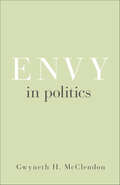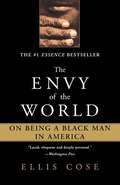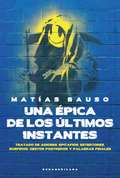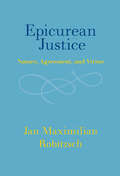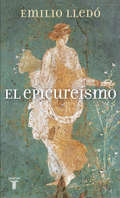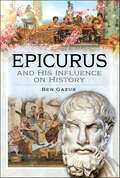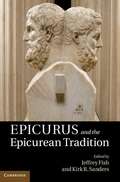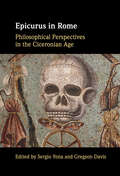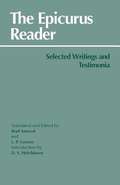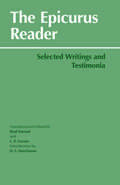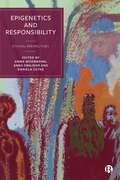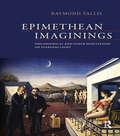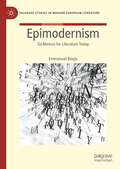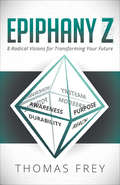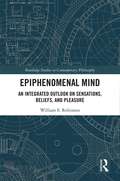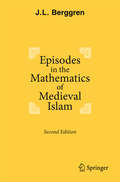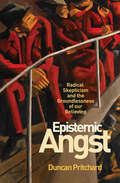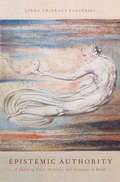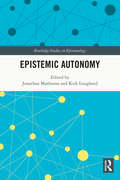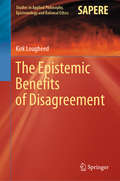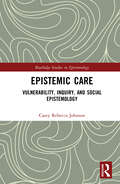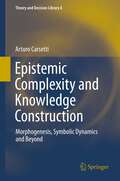- Table View
- List View
Envy in Politics (Princeton Studies in Political Behavior)
by Gwyneth H. McClendonHow envy, spite, and the pursuit of admiration influence politicsWhy do governments underspend on policies that would make their constituents better off? Why do people participate in contentious politics when they could reap benefits if they were to abstain? In Envy in Politics, Gwyneth McClendon contends that if we want to understand these and other forms of puzzling political behavior, we should pay attention to envy, spite, and the pursuit of admiration--all manifestations of our desire to maintain or enhance our status within groups. Drawing together insights from political philosophy, behavioral economics, psychology, and anthropology, McClendon explores how and under what conditions status motivations influence politics. Through surveys, case studies, interviews, and an experiment, McClendon argues that when concerns about in-group status are unmanaged by social conventions or are explicitly primed by elites, status motivations can become drivers of public opinion and political participation. McClendon focuses on the United States and South Africa—two countries that provide tough tests for her arguments while also demonstrating that the arguments apply in different contexts. From debates over redistribution to the mobilization of collective action, Envy in Politics presents the first theoretical and empirical investigation of the connection between status motivations and political behavior.
The Envy of the World
by Ellis CoseWith an eloquence and compassion reminiscent of James Baldwin's Letter to My Nephew, Ellis Cose presents a frank and realistic examination of the daunting challenges facing black men in twenty-first-century America and offers a way out of the cycle of defeatism and despair that wreaks havoc on America's black communities. Black men have never had more opportunity for success than they do today. Yet, as Ellis Cose bluntly puts it, "We are watching the largest group of black males in history stumbling through life with a ball and chain wrapped around their legs. If brought together in one incorporated region, the population of black males behind bars would instantly become the twelfth largest urban area in America." Add to that the ravages of AIDS, murder, poverty, and illiteracy, the raging anger between many black men and women, and the widening gap separating the black elite from the so-called underclass, and you have a prescription for a paralyzing pessimism. But even as he acknowledges the systemic obstacles that confront black men of all social strata, Ellis Cose refuses to accept them as reasons for giving up or giving in. In powerful and stirring prose, Cose rails against the historical worldview that has categorized academic achievement as a source of shame instead of pride in many black communities; he also outlines steps black males can take to enhance their odds for success. With insightful anecdotes about a broad range of black men -- from Franklin Raines, the first black man to run a Fortune 500 company, to unlettered ex-prisoners -- Cose documents the amazing journey the black race has made, and contemplates the challenges ahead. Both a warning of the vast social tragedy that is wasted black potential and a vital call to arms that can enable black men to reclaim their destiny, The Envy of the World is an honest and important book for anyone concerned about the future of America.
Una épica de los últimos instantes: Tratado de adioses. Epitafios. Estertores. Suspiros. Gestos postreros y palabras
by Matías BausoEscritores y deportistas, cómicos y políticos, divas y luchadoras,héroes y asesinos... todos mueren. Y todos, en general por acto, perotambién por omisión, se despiden de este mundo de alguna manera,producen un último gesto. Este libro cataloga distintas formas demarcharse, con las «últimas palabras» como eje, como una de las bellasartes, como género literario. Hay personas que elucubraron durante años la frase con la que se iban adespedir. Otros siguieron su naturaleza y murieron tal como vivieron,sin traicionar su esencia. Hay muertes naturales y las hay torpes, lashay esperadas e insólitas, y también hay formas de morir íntimamenteligadas a formas de matar. Y todas, sin excepción, dicen algo.
Epicurean Justice: Nature, Agreement, and Virtue
by Jan Maximilian RobitzschThe ancient Greek philosopher Epicurus and his followers advanced a sophisticated theory of justice that occupied a middle position between Plato and Aristotle, on the one hand, and some Sophists, on the other. They held that justice is neither fully natural nor fully conventional, that there is a robust virtue of justice, and that it is always better to be just than to be unjust, but it is not always better to obey the laws. In this book, the first English-language monograph on the topic, Jan Maximilian Robitzsch draws on a range of sources including papyrological evidence to give a comprehensive account of Epicurean justice. He shows how it relates to Epicurean philosophy as a whole and discusses to what extent it can be seen to anticipate modern positions such as contractarianism and legal positivism.
Epicureans and Atheists in France, 1650–1729
by Alan Charles KorsAtheism was the most foundational challenge to early-modern French certainties. Theologians and philosophers labelled such atheism as absurd, confident that neither the fact nor behaviour of nature was explicable without reference to God. The alternative was a categorical naturalism, whose most extreme form was Epicureanism. The dynamics of the Christian learned world, however, which this book explains, allowed the wide dissemination of the Epicurean argument. By the end of the seventeenth century, atheism achieved real voice and life. This book examines the Epicurean inheritance and explains what constituted actual atheistic thinking in early-modern France, distinguishing such categorical unbelief from other challenges to orthodox beliefs. Without understanding the actual context and convergence of the inheritance, scholarship, protocols, and polemical modes of orthodox culture, the early-modern generation and dissemination of atheism are inexplicable. This book brings to life both early-modern French Christian learned culture and the atheists who emerged from its intellectual vitality.
El epicureísmo
by Emilio LledóPREMIO PRINCESA DE ASTURIAS DE COMUNICACIÓN Y HUMANIDADES 2015 PREMIO NACIONAL DE LAS LETRAS ESPAÑOLAS 2014 Una propuesta para la felicidad Frente a la mística de las palabras vacías, de los consuelos imposibles y de los premios o castigos de otro mundo, Epicuro levantó la firme muralla de un mensaje revolucionario. Con ello alumbró, de una luz distinta, la democratización del cuerpo humano, el apego a la vida y a la desamparada carne de los hombres, entre cuyos sutiles y misteriosos vericuetos alentaba la alegría y la tristeza, la serenidad y el dolor, la generosidad y la crueldad. Y, sobre todo, imaginó una educación y política del amor, única forma posible y esperanzada de seguir viviendo. Epicuro lanzó uno de los mensajes más creadores del pensamiento filosófico que, por razones no muy difíciles de entender, ha sido tergiversado por los que sintieron amenazada la hipocresía de la que se alimentan. La filosofía de la corporeidad y del placer no fue, en ningún momento, esa grosera versión ideológica que una buena parte de la tradición nos ha entregado. Entre otras muchas cosas, el epicureísmo nos puso en camino para superar, desde una revolucionaria idea de la existencia, la doble moral, la doble o múltiple verdad, bajo la luz que se levanta desde el reconocimiento real del cuerpo, de su libertad y de su forzosa y solidaria instalación en el mundo. Emilio Lledó
Epicurus and His Influence on History
by Ben GazurHow should we live? In ancient Greece one man came up with a pleasingly simple answer to this question. The philosopher Epicurus taught his followers that pleasure and contentment were the aims of the good life. For hundreds of years Epicureanism was one of the dominant schools of philosophy. But by the 6th century it had all but disappeared. Discovering how and why Epicureanism was driven from philosophy and public discourse reveals much about how Western thought developed. Despite attempts to erase him, the lessons of Epicurus have been recovered from the mists of time and the ashes of Vesuvius. How he was restored to his place in history is a story of brilliant Renaissance scholars, chance discoveries, and a hunger for intellectual freedom. This new biography of Epicurus reveals the life of Epicurus and traces how his teachings have influenced thinkers across time. Epicurus still has much to teach us about friendship, happiness, and our place in the world.
Epicurus and the Epicurean Tradition
by Kirk R. Sanders Jeffrey FishEpicureanism after the generation of its founders has been characterised as dogmatic, uncreative and static. But this volume brings together work from leading classicists and philosophers that demonstrates the persistent interplay in the school between historical and contemporary influences from outside the school and a commitment to the founders' authority. The interplay begins with Epicurus himself, who made arresting claims of intellectual independence, yet also admitted to taking over important ideas from predecessors, and displayed more receptivity than is usually thought to those of his contemporaries. The same principles of autonomy and openness figure importantly in the three major areas of focus in these essays: theology, politics and the emotions.
Epicurus in Rome: Philosophical Perspectives in the Ciceronian Age
by Sergio Yona Gregson DavisThe role of Greek thought in the final days of the Roman republic is a topic that has garnered much attention in recent years. This volume of essays, commissioned specially from a distinguished international group of scholars, explores the role and influence of Greek philosophy, specifically Epicureanism, in the late republic. It focuses primarily (although not exclusively) on the works and views of Cicero, premier politician and Roman philosopher of the day, and Lucretius, foremost among the representatives and supporters of Epicureanism at the time. Throughout the volume, the impact of such disparate reception on the part of these leading authors is explored in a way that illuminates the popularity as well as the controversy attached to the followers of Epicurus in Italy, ranging from ethical and political concerns to the understanding of scientific and celestial phenomena.
Epicurus in Rome: Philosophical Perspectives in the Ciceronian Age
by Sergio Yona Gregson DavisThe role of Greek thought in the final days of the Roman republic is a topic that has garnered much attention in recent years. This volume of essays, commissioned specially from a distinguished international group of scholars, explores the role and influence of Greek philosophy, specifically Epicureanism, in the late republic. It focuses primarily (although not exclusively) on the works and views of Cicero, premier politician and Roman philosopher of the day, and Lucretius, foremost among the representatives and supporters of Epicureanism at the time. Throughout the volume, the impact of such disparate reception on the part of these leading authors is explored in a way that illuminates the popularity as well as the controversy attached to the followers of Epicurus in Italy, ranging from ethical and political concerns to the understanding of scientific and celestial phenomena. This title is also available as Open Access on Cambridge Core.
The Epicurus Reader: Selected Writings and Testimonia
by Epicurus L. P. Gerson D. S. Hutchinson Brad InwoodTABLE OF CONTENTS: Introduction The ancient biography of Epicurus The extant letters Ancient collections of maxims Doxographical reports The testimony of Cicero The testimony of Lucretius The polemic of Plutarch Short fragments and testimonia from known works: * From On Nature * From the Puzzles * From On the Goal * From the Symposium * From Against Theophrastus * Fragments of Epicurus' letters Short fragments and testimonia from uncertain works: * Logic and epistemology * Physics and theology * Ethics Index
The Epicurus Reader: Selected Writings and Testimonia
by Epicurus Brad Inwood Lloyd P. GersonTABLE OF CONTENTS:Introduction The ancient biography of Epicurus The extant letters Ancient collections of maxims Doxographical reports The testimony of Cicero The testimony of Lucretius The polemic of PlutarchShort fragments and testimonia from known works: * From On Nature * From the Puzzles * From On the Goal * From the Symposium * From Against Theophrastus * Fragments of Epicurus' lettersShort fragments and testimonia from uncertain works: * Logic and epistemology * Physics and theology * EthicsIndex
Epigenetics and Responsibility: Ethical Perspectives
by Emma Moormann, Anna Smajdor and Daniela CutasEPUB and EPDF available Open Access under CC-BY-NC-ND licence. We tend to hold people responsible for their choices, but not for what they can’t control: their nature, genes or biological makeup. This thought-provoking collection redefines the boundaries of moral responsibility. It shows how epigenetics reveals connections between our genetic make-up and our environment. The essays challenge established notions of human nature and the nature/nurture divide and suggest a shift in focus from individual to collective responsibility. Uncovering the links between our genetic makeup, environment and experiences, this is an important contribution to ongoing debates on ethics, genetics and responsibility.
Epimethean Imaginings: Philosophical and Other Meditations on Everyday Light
by Raymond TallisThese essays, written in the spirit of Goethe’s Epimetheus who "traces the quick deed to the dim realm of form-combining possibilities", display the depth and breadth of Tallis’s fascination with our lives. Whether discussing philosophical "hardy perennials" like time, or a mundane artefact like ink, Tallis challenges us to think differently about who we are and why we are. The first part of the book – Analysis – dives into the deep-end to explore some of the big questions in philosophy: perception, knowledge and belief; time; the relationship between mathematics and reality; and probability and causation. The middle section – Tetchy Interludes – takes a wry look at some aspects of contemporary art; stupidity (including the author’s own); and Christmas. The third part – Celebration – is more experimental in both its subject matter and treatment. It celebrates the complexity of ordinary, everyday consciousness by contemplating the miracle of speech, artefacts that have transformed our lives (and what they reveal about our cognition) such as the wheel, the sail, and ink; and ‘snapshots’ of the author’s own consciousness on an ordinary day, of past consciousness, as captured in historical memory. Notwithstanding their diversity in theme and style, these essays share the common aim of discovering and celebrating the submerged riches in the "quick deeds" of our everyday lives and perceptions.
Epimodernism: Six Memos for Literature Today (Palgrave Studies in Modern European Literature)
by Emmanuel BoujuPostmodernism has had its day. Are we now in the era of epimodernism? Reinterpreting the six “memos” that Italo Calvino suggested more than thirty years ago for “the new Millennium”, in this acclaimed book Emmanuel Bouju identifies six new values for literature in the twenty-first century: Superficiality, Secrecy, Energy, Acceleration, Credit, and Follow Through. Based on the principal meanings of the Ancient Greek prefix epi – surface, contact, origin, extension, duration, authority, and finality – these values represent six different ways of relating to the legacy of modernist utopias, reorienting postmodern critique and rebooting, with all due irony, its various forms of engagement and empowerment. Equal parts cultural criticism and literary creation, this highly original essay both enacts and explores the epimodern turn in contemporary European literature. Rigorous and humorous, provocative and playful, Epimodernism helps us to understand what literature can describe, imagine, and invent in our challenging times.
Epiphany Z: 8 Radical Visions for Transforming Your Future
by Thomas Frey"Epiphany Z" is Futurist Thomas Frey&’s dynamic approach to envisioning, comprehending, and ultimately thriving in the radically different futures emerging around us at the speed of light. Frey&’s unparalleled ability to detect emerging trends from the smallest of clues gives him an edge on other futurists. Now he&’s sharing that edge with you.What are tomorrow&’s hottest industries?What huge industries of today are doomed to extinction?How will our lives be changed by advancements in robotics, in drone technology, in manufacturing and transportation?How can education cope with the explosive new world of enhanced information, hyperactive business environments, cultural shifts that would have been unimaginable as recently as yesterday?Who will be the masters of tomorrow&’s universe and who will be left behind?Above all, how can you not only protect yourself from the most disruptive aspects of the changes sweeping your way---how can you become one of the masters of those changes?Distilling decades of research, experience, and proven success in correctly identifying and accurately extrapolating today&’s trends and innovations into tomorrow&’s realities, Thomas Frey gives you an advance ticket to the most explosive period of change in all of human history.Those changes are taking place now. Thomas Frey shows where they will be taking all of us tomorrow. "EPIPHANY Z" your roadmap to the future.
Epiphenomenal Mind: An Integrated Outlook on Sensations, Beliefs, and Pleasure (Routledge Studies in Contemporary Philosophy)
by William S. RobinsonAccording to epiphenomenalism, our behavior is caused by events in our brains that also cause our mentality. This resulting mentality reflects our brains’ organization, but does not in turn cause anything. This book defends an epiphenomenalist account of philosophy of mind. It builds on the author’s previous work by moving beyond a discussion of sensations to apply an epiphenomenalist outlook to other aspects of mental causation such as beliefs, desires, pleasure, and displeasure. The first four chapters of the book argue for a dualistic theory of sensations and develop an epiphenomenalist version of dualism. The remaining chapters discuss propositional attitudes and valence. The author also responds to potential objections to epiphenomenalism by considering how sensations, intelligence, or understanding might be built into a robot. This book will be of interest to scholars and students in philosophy of mind who are interested in consciousness, mental causation, and how our mentality is situated in the world.
Episodes in the Mathematics of Medieval Islam
by J. L. BerggrenThis book presents an account of selected topics from key mathematical works of medieval Islam, based on the Arabic texts themselves. Many of these works had a great influence on mathematics in Western Europe. Topics covered in the first edition include arithmetic, algebra, geometry, trigonometry, and numerical approximation; this second edition adds number theory and combinatorics. Additionally, the author has included selections from the western regions of medieval Islam--both North Africa and Spain. The author puts the works into their historical context and includes numerous examples of how mathematics interacted with Islamic society.
Epistemic Angst
by Duncan PritchardEpistemic Angst offers a completely new solution to the ancient philosophical problem of radical skepticism--the challenge of explaining how it is possible to have knowledge of a world external to us.Duncan Pritchard argues that the key to resolving this puzzle is to realize that it is composed of two logically distinct problems, each requiring its own solution. He then puts forward solutions to both problems. To that end, he offers a new reading of Wittgenstein's account of the structure of rational evaluation and demonstrates how this provides an elegant solution to one aspect of the skeptical problem. Pritchard also revisits the epistemological disjunctivist proposal that he developed in previous work and shows how it can effectively handle the other aspect of the problem. Finally, he argues that these two antiskeptical positions, while superficially in tension with each other, are not only compatible but also mutually supporting.The result is a comprehensive and distinctive resolution to the problem of radical skepticism, one that challenges many assumptions in contemporary epistemology.
Epistemic Authority: A Theory of Trust, Authority, and Autonomy in Belief
by Linda Trinkaus ZagzebskiIn this book the author gives an extended argument that the self-reflective person is committed to belief on authority. Epistemic authority is compatible with autonomy, but epistemic self-reliance is incoherent.
Epistemic Autonomy (Routledge Studies in Epistemology)
by Jonathan Matheson Kirk LougheedThis is the first book dedicated to the topic of epistemic autonomy. It features original essays from leading scholars that promise to significantly shape future debates in this emerging area of epistemology. While the nature of and value of autonomy has long been discussed in ethics and social and political philosophy, it remains an underexplored area of epistemology. The essays in this collection take up several interesting questions and approaches related to epistemic autonomy. Topics include the nature of epistemic autonomy, whether epistemic paternalism can be justified, autonomy as an epistemic value and/or vice, and the relation of epistemic autonomy to social epistemology and epistemic injustice. Epistemic Autonomy will be of interest to researchers and advanced students working in epistemology, ethics, and social and political philosophy.
Epistemic Autonomy (Routledge Studies in Epistemology)
by Jonathan Matheson Kirk LougheedThis is the first book dedicated to the topic of epistemic autonomy. It features original essays from leading scholars that promise to significantly shape future debates in this emerging area of epistemology.While the nature of and value of autonomy has long been discussed in ethics and social and political philosophy, it remains an underexplored area of epistemology. The essays in this collection take up several interesting questions and approaches related to epistemic autonomy. Topics include the nature of epistemic autonomy, whether epistemic paternalism can be justified, autonomy as an epistemic value and/or vice, and the relation of epistemic autonomy to social epistemology and epistemic injustice.Epistemic Autonomy will be of interest to researchers and advanced students working in epistemology, ethics, and social and political philosophy.
The Epistemic Benefits of Disagreement (Studies in Applied Philosophy, Epistemology and Rational Ethics #51)
by Kirk LougheedThis book presents an original discussion and analysis of epistemic peer disagreement. It reviews a wide range of cases from the literature, and extends the definition of epistemic peerhood with respect to the current one, to account for the actual variability found in real-world examples. The book offers a number of arguments supporting the variability in the nature and in the range of disagreements, and outlines the main benefits of disagreement among peers i.e. what the author calls the benefits to inquiry argument.
Epistemic Care: Vulnerability, Inquiry, and Social Epistemology (Routledge Studies in Epistemology)
by Casey Rebecca JohnsonThis book uses the framework of care ethics to articulate a novel theory of our epistemic obligations to one another. It presents an original way to understand our epistemic vulnerabilities, our obligations in education, and our care duties toward others with whom we stand in epistemically vulnerable relationships. As embodied and socially interdependent knowers, we have obligations to one another that are generated by our ability to care – that is, to meet each other’s epistemic vulnerabilities. The author begins the book by arguing that the same motivations that moved social epistemologists away from individualistic epistemology should motivate a move to a care-based theory. The following chapters outline our epistemic care duties to vulnerable agents, and offer criteria of epistemic goodness for communities of inquiry. Finally, the author discusses the tension between epistemic care and epistemic paternalism. Epistemic Care will be of interest to scholars and advanced students working in social epistemology, ethics, feminist philosophy, and philosophy of education.
Epistemic Complexity and Knowledge Construction
by A. CarsettiThe volume as its first target aims at clarifying that peculiar entanglement of complexity, causality, meaning, emergence and intentionality that characterises the unfolding of the "natural forms" of human cognition As is well known, cognition is not only a self-organising process. It is also a co-operative and coupled process. If we consider the external environment as a complex, multiple and stratified Source which interacts with the nervous system, we can easily realise that the cognitive activities devoted to the "intelligent" search for the depth information living in the Source, may determine the very change of the complexity conditions according to which the Source progressively expresses its "wild" action. In this sense, simulation models are not neutral or purely speculative: the true cognition actually appears to be necessarily connected with successful forms of reading, those forms, in particular, that permit a specific coherent unfolding of the deep information content of the Source. Therefore, the simulation models, if valid, materialise as "creative" channels, i.e., as autonomous functional systems, as the very roots of a new possible development of the entire system represented by mind and its Reality. From a general point of view, the objectivity of Reality is also proportionate to the autonomy reached by cognitive processes. In this sense, at the level of cultural evolution, reference procedures act as guide, mirror and canalisation with respect to primary information flows and involved selective forces: they offer themselves as the actual instruments for the constant renewal of the code, for the invention and the actual articulation of an ever-new incompressibility. From an effective point of view, they appear as indissolubly linked to the successive definition of specific (and innovative) measures of the epistemic complexity. These measures cannot concern only statistical rarity (Shannon) or computational incompressibility (Kolmogorov-Chaitin), on the contrary they should also be able to take into account the coupled connection between the Source and the cognitive agent, the evolution of this connection as well as the successive constitution of meaning as symbolic form. Hence the possible (and necessary) definition of new axiomatic systems, new measure spaces, the real displaying of processes of continuous reorganisation at the semantic level. Indeed, it is only through a complete, first-order "reduction" and a correlated non-standard second-order analysis that new incompressibility will actually manifest itself. Therefore, the reference procedures appear to be related to a process of multiplication of minds, as well as to a process of "clarification" of meanings which finally emerges as vision via principles.
